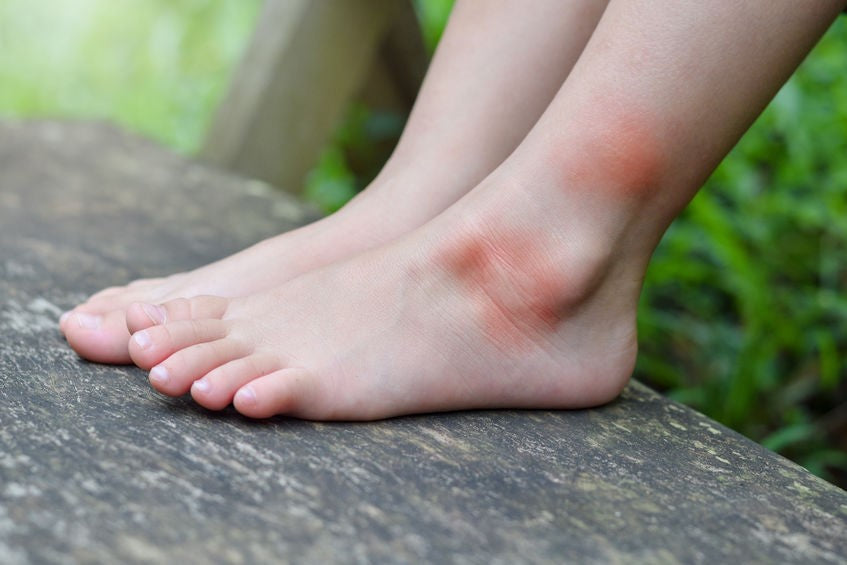
Skeeter Syndrome: Diagnosis and Treatment Options
Most of us have been bitten by mosquitoes, usually on many occasions. Along with this, we've experienced the swelling, redness and itchiness that can accompany an attack by this nearly ubiquitous, irksome flying insect. If left alone, however, the symptoms and bite mark disappear within a few days.
With some people, however, the reaction to a mosquito bite is more severe. Swelling occurs to a greater extent, with welts that are two to 10 centimeters (four inches) in diameter forming within about an hour of the bite and increasing in size over the next few days. Along with swelling, the area of the bite can be red, itchy, painful and warm to the touch. The individual may also develop a fever. It may look like the individual is experiencing an allergic reaction to mosquito bites. This can be what is known as Skeeter Syndrome.

Cause and diagnosis of Skeeter Syndrome
Skeeter syndrome is caused by the affected person having an allergic reaction to mosquito bites - specifically, the proteins in mosquito saliva. Diagnosis is based on being able to accurately correlate an individual's symptoms to being bitten by a mosquito, since there is no blood test for mosquito antibodies. This can be tricky if the bite is on a younger child who doesn't know they have been bitten. For this reason, it is always a good idea to note if there are mosquitoes about any time you spend time outdoors.
Sometimes Skeeter syndrome is mistaken for cellulitis, a bacterial infection that affects the deeper layers of skin tissue. Cellulitis can be quite serious and potentially life-threatening if not treated with systemic antibiotics. Antibiotics do not treat Skeeter syndrome, however. Physicians diagnosing Skeeter syndrome conduct a careful history and physical examination. Often, patients diagnosed with Skeeter syndrome have experienced more than one occurrence.
How rare is skeeter syndrome? Actually, this mosquito bite allergy is considered relatively rare. Those most frequently affected are infants and young children who've been bitten by mosquitoes and sensitized, but haven't yet developed natural immunity. It's also seen more commonly in people who have traveled to a new location and are bitten by types of mosquitoes they haven't encountered before.
Skeeter Syndrome treatment
Studies have found that although symptoms in children can appear within only 20 minutes of being bitten, there's no reason for serious concern unless the child appears to be going into anaphylaxis, a severe, potentially life-threatening allergic response. Anaphylaxis requires immediate medical attention, including a dose of epinephrine.
If the site of the mosquito bite is left alone and does not become infected, the area will heal, and symptoms will cease within a few days. In the meantime, the wound should be kept clean using warm water and hypoallergenic soap. Cool compresses and regular application of calamine lotion or over-the-counter (OTC) hydrocortisone cream will help alleviate the itchiness.
For extra-intense allergic responses, an OTC antihistamine such as Benadryl or Chlor-Trimeton can help. Doctor-prescribed, long-acting oral antihistamines like Zyrtec (cetirizine), Xyzal (levocetirizine) or Allegra (fexofenadine) may also be used if needed for symptom relief.
Ways to avoid mosquito bites
Of course, the best way to deal with Skeeter syndrome is to avoid mosquito bites altogether. Practicable measures include wearing protective, long-sleeved clothing and long pants; using insect repellent sprays liberally and reapplying according to product instructions; not wearing bright colors or perfumes, which can attract mosquitoes; and avoiding areas where there's standing water.
According to the Centers for Disease Control and Prevention (CDC), chemical mosquito repellents containing one of the following active ingredients are most effective in mosquito bite protection:
- DEET (Chemical name: N,N-diethyl-m-toluamide or N,N-diethyl-3-methyl-benzamide)
- Picaridin (Chemical name: 2-(2-hydroxyethyl)-1-piperidinecarboxylic acid 1-methylpropyl ester)
- Oil of Lemon Eucalyptus (OLE or PMD) (Chemical name: para-menthane-3,8-diol)
- IR3535 (Chemical name: 3-[N-butyl-N-acetyl]-aminopropionic acid, ethyl ester)
- 2-Undecanone (Chemical name: methyl nonyl ketone)
Trust MosquitoNix ® to help you protect your outdoor spaces
The most effective way to avoid getting bitten and avoid Skeeter Syndrome is to eradicate mosquitoes completely from your property. Not only can mosquito bites cause Skeeter Syndrome, but mosquitoes also carry nasty viruses to humans and livestock.
Here at MosquitoNix we are the national leader in mosquito control. We offer permanent, temporary and portable mosquito and pest control options to eradicate mosquitoes, no-see-ums, black flies and many more flying pests.

Serving both residential and commercial properties, we offer superior customer service, trained and licensed employees and state-of-the-art products and services.
Contact us today for a free estimate and make mosquitoes a thing of the past.
Leave a comment
Comments will be approved before showing up.




